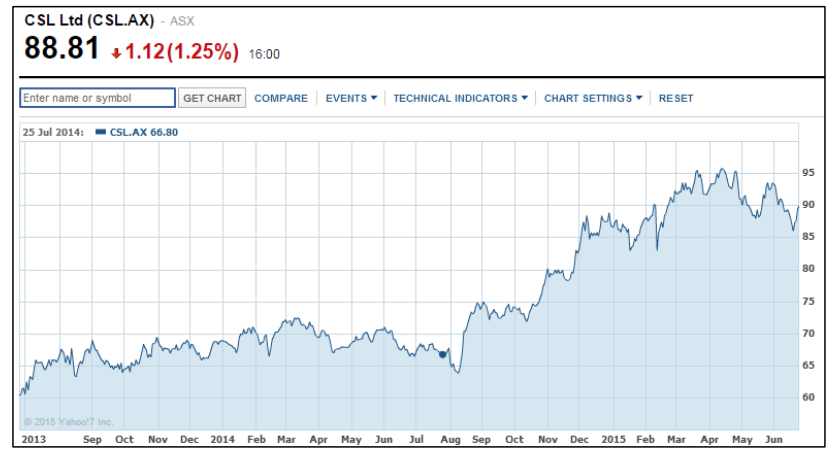
Should you buy CSL?
CSL Limited’s (ASX: CSL) share price has strengthened in recent years (appreciating from below $30 to over $90), supported by the firm’s consistent approach to dividend policy and a steady commitment to share buybacks.
At such heights, it’s prudent to review the firm’s prospects. Before we do that, let’s briefly review the firm as it stands. CSL is a multinational producer of blood derivatives, vaccines and other treatments.
CSL is a multinational producer of blood derivatives, vaccines and other treatments.
The key products manufactured by CSL are summarised as follows:
- Immunoglobulin (43 per cent of financial year 2014 revenues): Immunoglobulin’s (IG) are groups of antibodies used to treat disorders such as Primary Immune Deficiency or multiple sclerosis.
- Albumin (13 per cent of financial year 2014 revenues): Albumin is a protein produced by the liver that maintains blood volume. It’s used to treat burns and in situations where blood volume is not optimal.
- Factor VIII (coagulation factors, 20 per cent of financial year 2014 revenues): One of the key proteins in blood that aids clotting. Used as a treatment for Haemophilia A.
- Specialty Products (16 per cent of financial year 2014 revenues): Used to treat a variety of rare diseases.
In order to create many of these products, the firm must source plasma from blood donors. Plasma is a component of blood that can be separated through a fractionalisation process.
The market for these products is growing by about 6-7 per cent per annum, and it’s interesting how this is unfolding. Whilst overall demand is growing at 5 per cent per annum (driven by a mixture of population growth and higher rates of diagnosis), the supply of plasma from volunteer donations (i.e. those who donate their blood for free) is not growing. Hence, future market growth has to be supported by paid donations.
The paid donation market largely consists of just 3 countries; Austria, Germany and the United States. CSL has 107 collection centres in the latter (out of approximately 500 in the country) meaning it controls a substantial amount of world plasma sourcing.
CSL has done well over the last 5 years, growing its global market share by about 1 per cent per annum (from circa 15 per cent to 20 per cent). This was driven largely by gains in the $8.3 billion global immunoglobulin market where other competitors appear to have had supply issues. Further, CSL developed a product; Hizentra, that could administer the dose of immunoglobulin by patients in the comfort of their own home – something which competitors did not have an answer to.
Hence, favourable competitive conditions and strong global demand have supported CSL’s growth over the last few years.
So where does this leave us now? Well, going forward it appears that those competitors (previously supply constrained) are back and hence the immunoglobulin market appears set to become a lot more competitive. Estimating the impact on CSL’s future revenue growth is no exact science, but what we can say is that future growth rates are less likely to be as high at they are now.
Further competitive pressures are noted in the Factor VIII market. New entrants are poised to enter, transforming what may have historically been considered a comfortable oligopoly into a more competitive environment.
On this basis, our internal analysis indicates a base case valuation for the CSL share price in the $60 to $80 range. So with a share price in the high $80’s, the firm appears overvalued. However the price isn’t without justification, as new products could boost revenue growth above our expectations and further falls in the Australian dollar could push the valuation up. Some bullish views could easily see the firm trading above $100.
However, if all doesn’t go to plan the downside is evident. Tread carefully.
The Montgomery Fund and The Montgomery Private Fund hold positions in CSL Limited.
This article is for general advice and educational purposes only. Before you commit to any investment decision we strongly recommend you seek the counsel of a licensed investment adviser.
Scott Shuttleworth is an analyst at Montgomery Investment Management. To invest with Montgomery, find out more.
This post was contributed by a representative of Montgomery Investment Management Pty Limited (AFSL No. 354564). The principal purpose of this post is to provide factual information and not provide financial product advice. Additionally, the information provided is not intended to provide any recommendation or opinion about any financial product. Any commentary and statements of opinion however may contain general advice only that is prepared without taking into account your personal objectives, financial circumstances or needs. Because of this, before acting on any of the information provided, you should always consider its appropriateness in light of your personal objectives, financial circumstances and needs and should consider seeking independent advice from a financial advisor if necessary before making any decisions. This post specifically excludes personal advice.
INVEST WITH MONTGOMERY
Hi Scott
Management are no doubt aware of the challenges facing the blood and plasma business in the future and perhaps that is why they pursued the acquisition of Novartis.
Do you believe this somewhat de-risks the business going forward giving it another avenue of growth or is the school of thought that the potential earnings from this business will never be material to the group?
Our current view is that the acquisition isn’t likely to be material to future earnings.